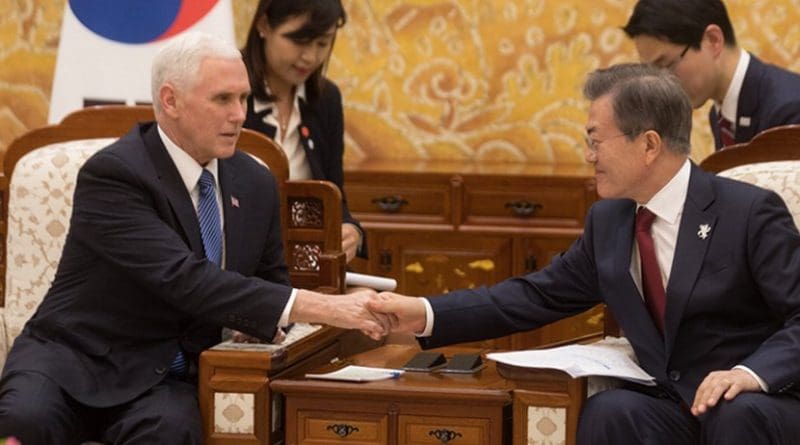US, South Korea Will Agree Deal But Tensions Won’t End – Analysis
The US-South Korean defense relationship is undergoing a real test of nerves. While the Trump administration is pushing for a large payment increase from Seoul for protecting the country from possible North Korean or Chinese invasion, South Korea rejects the notion of having to pay for the US to defend the country. The tension is growing because North Korea conducted a series of weapons tests and waged a war of words with Trump at the end of last year.
Seoul’s payments are likely to come through and the US protection of South Korea will obviously continue. Trump says that the US still reserves the right to use military force against North Korea, even while the administration’s negotiations are halted.
It is important to understand some of the context behind this exchange between the US and South Korea. There is no doubt that American presidents have longed for a better cost-benefit relationship with their security partners. Both the US and South Korea now face complex strategic challenges that neither country can afford to allow to continue as they are in the current context.
Indeed, South Korea has made major contributions in its relationship with the US. Seoul modernized its fighter aircraft and enhanced its antisubmarine and ballistic missile defense capabilities. President Moon Jae-in’s government increased South Korea’s defense budget by 8.2 percent in 2019 and intends to raise it by a further 7.1 percent annually until 2024. South Korean forces have also deployed in support of US coalition operations.
However, according to the Pentagon, South Korea bears no more than a third of the costs most directly associated with the stationing of US forces on the Korean Peninsula. As these costs rise, South Korea’s share is shrinking. Moreover, these narrowly defined costs are only one part of the picture. America’s contributions to South Korea’s defense in this highly technological age — including some advanced capabilities Seoul still needs to acquire — far exceed the cost of US “boots on the ground” and constitute a far larger burden for the American taxpayer than meets the eye.
For the US, greater burden-sharing means a healthier relationship. More than 90 percent of South Korea’s cost-sharing contributions currently go right back into the local economy in the form of salaries for South Korean nationals employed by US Forces Korea, construction contracts, and other services purchased locally to sustain the American presence.
The two countries are again engaged in tough financial negotiations with almost a pre-determined outcome. The US remains firmly committed to reaching a mutually beneficial and equitable financial agreement that will strengthen the alliance and the two countries’ combined defense far into the future. For America, South Korea’s taking on of a greater share of the load would ensure the alliance remains the linchpin of peace and prosperity on the Korean Peninsula and in Northeast Asia.
Understanding South Korean views of America at this juncture is a critical aspect of the negotiations. Most surveys show a majority of South Koreans support the US military presence as deterrence against potential attack by North Korea, but there is still a determined anti-US sentiment. One example where culture clashes with policy is in the South Korean perception of the current US ambassador. Since arriving in Seoul in July 2018, retired Adm. Harry B. Harris has been under scrutiny because of his military and ethnic background. The 63-year-old former US Pacific Command admiral attracts criticism from those who take issue with his manner when dealing with South Koreans because of his Japanese descent. Moreover, South Koreans who reject America’s “imperialist” approach to the negotiations rib Harris for his mustache. The mustache is provoking criticism due to the history of the region, as it resembles those worn by many of the Japanese colonial masters who occupied the Korean Peninsula from 1910 to 1945.
After meeting Harris in November, Lee Hye-hoon, then-chairwoman of the South Korean Parliament’s intelligence committee, said the US ambassador repeatedly called on Seoul to drastically increase its financial contribution, in what was seen as a pushy cultural insult. Consequently, anti-American sentiment because of the talks is rising and, in October, four students were arrested after they broke into Harris’ Seoul residence during an anti-US rally. Across South Korean generations, US behavior is seen as shameful. This sentiment has been an enduring part of the South Korean cultural landscape since the 1950s, and is necessary to recognize as a cultural driver affecting politics and policy. For South Koreans, America’s “imperialistic manner” during the negotiations further cements attitudes that may appear in the country’s election cycle, where nationalist currents can feed on such perceptions.
This difficult period of time between the two countries will pass and an agreement will be signed, but the security and perception issues will continue — as will Seoul’s relations with its neighbor and another US ally, Japan. These ties are going to be testy and challenging for all parties as agreements are modified. This Northeast Asian security triangle, which is undergoing fiscal and technical adjustments and enhancements, is being primed for what all three countries see as the main competitor, China, and the main threats, North Korea and Russia, at a more equal cost burden.

